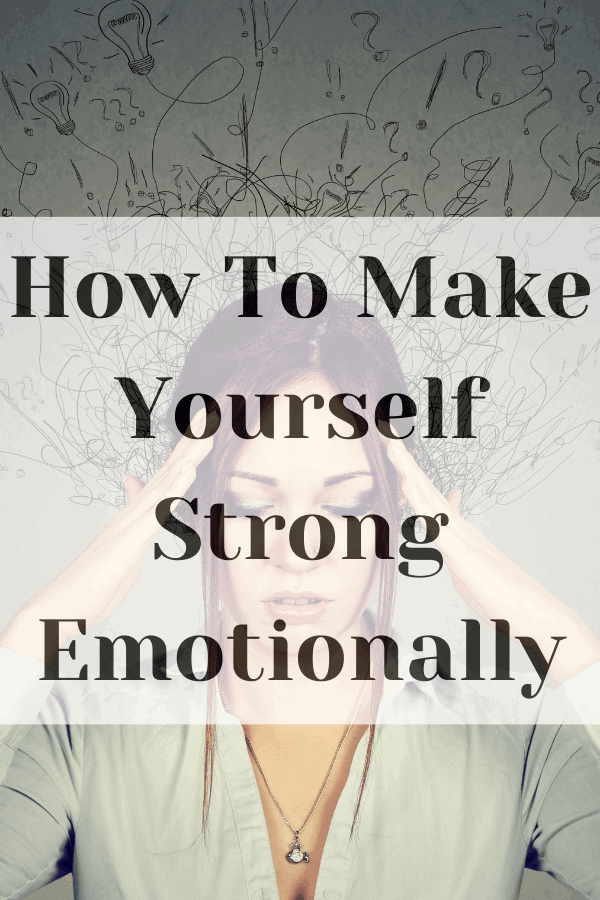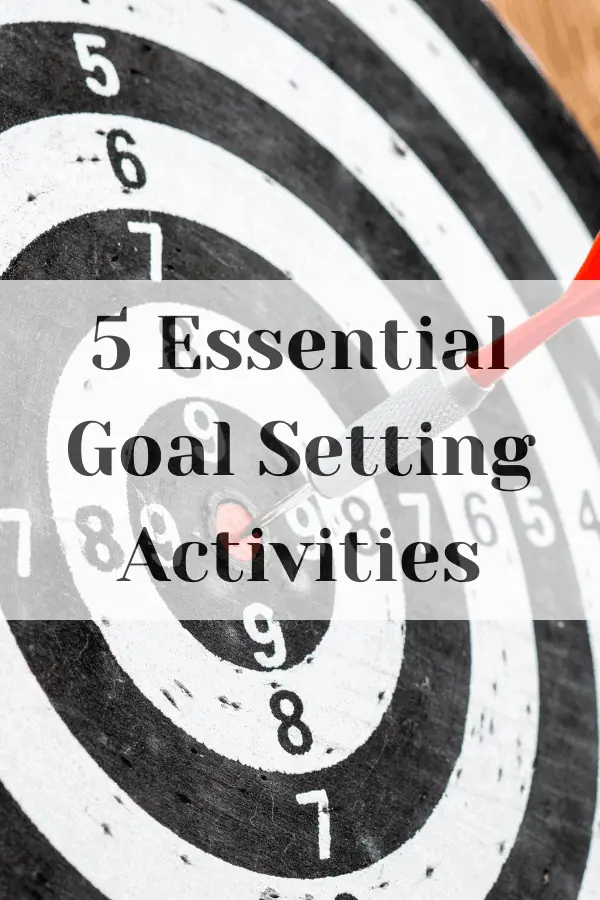How To Make Yourself Strong Emotionally

Are you ready to unlock your inner power and discover the secret to making yourself strong emotionally? In this blog post, we will explore the importance of emotional strength and how it can positively impact your daily life. By understanding how to make yourself strong emotionally, you’ll gain the tools to take control of your emotions and live a more fulfilling and empowered life.
Emotional strength is the key that allows you to navigate life’s challenges with confidence and resilience. When emotions control our reactions, it can lead to undesirable outcomes, leaving us feeling overwhelmed and disempowered. However, by learning how to make yourself strong emotionally, you can regain control and respond to situations in a more balanced and empowered way.
Throughout this blog post, we will delve into practical strategies and insights to help you develop emotional strength and overcome the common problem of allowing emotions to control your life. From understanding the true meaning of emotional strength to cultivating self-awareness, building resilience, and practising effective emotional regulation, you will discover a roadmap to strengthen your emotional well-being.
So, are you ready to embark on this transformative journey? Let’s dive in and learn how to make yourself strong emotionally, empowering you to lead a more fulfilling and authentic life.
This post is about how to make yourself strong emotionally

The Importance of Emotional Strength
Life is a beautiful tapestry, woven with moments of joy and moments of sorrow. Emotional strength serves as the key that helps us maintain our balance throughout this journey, allowing us to navigate the highs and lows with resilience and grace. It empowers us to rise above adversity, make sound decisions, and nurture healthy relationships. In the midst of chaos, emotional strength becomes our guiding compass, offering stability, courage, and clarity.
However, many of us find ourselves locked in a struggle with our emotions, as they often take control of our lives and dictate our reactions. Unchecked and untamed, these emotionally driven responses can lead to impulsive behaviour, irrational decisions, and strained relationships. The consequences of such reactions can have a profound impact on our overall well-being, personal growth, and quest for fulfilment. But fear not, for we each possess the power to regain control.
To cultivate emotional strength, it is vital to understand the misconceptions that surround it and redefine our perspective.
Misconception 1: Emotional strength means suppressing emotional
Contrary to popular belief, emotional strength does not involve burying or suppressing our emotions. Instead, it requires developing a healthy relationship with our emotions, embracing them, and deciphering their messages. By acknowledging our emotions, we gain valuable insights into our thoughts, needs, and desires, paving the way for self-discovery and growth.
Misconception 2: Emotional strength implies a lack of vulnerability
Strength should not be confused with invulnerability. Emotional strength enables us to embrace vulnerability as a catalyst for growth and connection. It is through vulnerability that we develop empathy, forge meaningful relationships, and cultivate resilience. By accepting and acknowledging our vulnerabilities, we tap into our inner strength and harness it to overcome obstacles.
Now that we have dispelled these misconceptions, let’s explore the foundational step toward developing emotional strength: emotional awareness.
Developing Emotional Awareness
The journey toward emotional strength begins with cultivating a deep sense of self-awareness and the ability to recognise our emotions. Through emotional awareness, we gain insights into our emotional landscape, empowering us to respond thoughtfully and purposefully to the world around us.
The Importance of Self-Awareness and Recognising Emotions
Self-awareness serves as the cornerstone of emotional intelligence and provides a key to understanding our emotional patterns, triggers, and responses. By tuning in to our emotions, we deepen our understanding of ourselves and the factors that impact our emotional well-being. Self-awareness enables us to identify and address negative thought patterns, break free from self-limiting beliefs, and embrace both our strengths and weaknesses.
Practical Tips for Becoming More Aware of One’s Emotional State
Mindful Reflection
Take a few moments each day to reflect on your emotions without judgment. Observe the sensations, thoughts, and emotions that arise within you, cultivating a non-reactive awareness.
Journaling
Maintain a journal to record your emotions, experiences, and reflections. This practice helps identify patterns, triggers, and the underlying reasons behind your emotional reactions.
Seek Feedback
Reach out to trusted friends or family members for honest feedback on how they perceive your emotional responses. Their insights can offer valuable perspectives that deepen your self-awareness.
Engage in Mindfulness Practices
Incorporate mindfulness meditation and other mindfulness-based activities into your routine. These practices cultivate present-moment awareness and help you connect with your emotions in a non-judgmental way.
By actively engaging in these practices, you will gradually enhance your emotional awareness, enabling you to navigate your emotions with clarity and purpose.
Understanding Emotional Strength
Emotional strength is the cornerstone of personal growth and the key to unlocking our true potential. It empowers us to navigate life’s challenges with resilience, authenticity, and inner fortitude. In this section, we will explore the definition of emotional strength, dispel common misconceptions, and examine how societal influences shape our perception of this essential attribute.
Defining Emotional Strength
Emotional strength encompasses more than just resilience; it involves understanding, managing, and harnessing our emotions in a constructive manner. It’s not about suppressing or denying our feelings, but rather developing self-awareness and skills to respond effectively to them. Emotional strength allows us to face difficult emotions head-on, learn from them, and channel their energy into positive actions.
At its core, emotional strength fosters growth and transformation. It equips us to face adversity, adapt to change, and thrive in uncertain situations. By cultivating emotional strength, we become better equipped to handle life’s complexities, make informed decisions, and maintain healthy relationships.
Misconception 1: Emotional strength implies invulnerability
Contrary to popular belief, emotional strength is not synonymous with invulnerability. It doesn’t require suppressing or numbing our emotions; instead, it involves embracing them with compassion and curiosity. True emotional strength lies in acknowledging our vulnerabilities, recognising that they are not signs of weakness, but opportunities for growth and connection.
Misconception 2: Emotional strength means going it alone
Another common misconception is that emotional strength necessitates navigating life’s challenges in isolation. However, true emotional strength lies in our ability to seek support, build meaningful connections, and rely on others when needed. It’s the recognition that vulnerability and interdependence are not signs of weakness, but integral aspects of our human experience.
Society’s Influence: Redefining Emotional Strength
Societal norms and cultural influences often shape our understanding of emotional strength. Media portrayals often emphasise stoicism and the suppression of emotions, inadvertently promoting an incomplete view of emotional strength. It’s crucial to challenge these societal narratives and redefine emotional strength according to our own values and aspirations.
True emotional strength involves embracing our authentic selves, honouring our emotions, and cultivating self-compassion. It’s about harnessing vulnerability as a source of courage and connection rather than viewing it as a liability.
By breaking free from societal constraints and redefining emotional strength on our terms, we open ourselves up to a world of personal growth and self-discovery.
In the upcoming sections of this blog post, we will explore practical strategies for developing emotional awareness, building resilience, practising emotional regulation, cultivating a positive mindset, nurturing healthy coping mechanisms, seeking support, and prioritising self-care and self-compassion. Let’s embark on this transformative journey together and unlock the power of emotional strength.
Developing Emotional Awareness
Emotional awareness serves as the foundation for building emotional strength. It is the practice of recognising, understanding, and acknowledging our emotions, allowing us to navigate them with clarity and intention. This section will explore the power of self-awareness as the first step towards developing emotional strength. We will also delve into the significance of recognising and acknowledging our emotions as a pathway to personal growth. Additionally, practical tips will be provided to help enhance emotional awareness.
The Power of Self-Awareness: The First Step to Emotional Strength
Self-awareness is a profound tool that enables us to develop a deeper understanding of ourselves, including our thoughts, emotions, and behavioural patterns. It is the ability to observe and reflect upon our inner experiences without judgment or criticism. By cultivating self-awareness, we gain valuable insights into the complexities of our emotional landscape, empowering us to respond consciously rather than react impulsively.
Self-awareness acts as a mirror that reflects our emotions, thoughts, and actions, allowing us to recognise patterns and triggers that influence our emotional well-being. When we are aware of our emotions, we can make informed choices, communicate more effectively, and nurture healthier relationships.
Recognising and Acknowledging Emotions: The Path to Growth
Recognising and acknowledging our emotions is a crucial step towards emotional growth and strength. It involves developing a compassionate and non-judgmental attitude towards our feelings and embracing them as valuable sources of information and guidance. By acknowledging our emotions, we validate our inner experiences and create space for personal growth and healing.
When we suppress or ignore our emotions, they tend to intensify and manifest in unhealthy ways. However, when we acknowledge and accept our emotions, we can explore their underlying causes and learn from them. This process allows us to gain insights into our needs, values, and desires, facilitating personal growth and empowering us to make positive changes in our lives.
Practical Tips for Enhancing Emotional Awareness
Mindful Reflection
Set aside dedicated moments each day to engage in mindful reflection. Create a quiet space where you can observe your emotions without judgment. Pay attention to the sensations, thoughts, and emotions that arise within you, cultivating a non-reactive awareness.
Journaling
Maintain a journal where you can regularly record your emotions, experiences, and reflections. This practice helps you identify patterns, triggers, and the underlying reasons behind your emotional reactions. Use your journal as a safe space for self-expression and exploration.
Seek Feedback
Reach out to trusted friends, family members, or a therapist and ask for their honest feedback on how they perceive your emotional responses. Their insights can provide valuable perspectives that deepen your self-awareness and expand your understanding of your emotional patterns.
Engage in Mindfulness Practices
Explore mindfulness meditation and other mindfulness-based activities to cultivate present-moment awareness and connect with your emotions in a non-judgmental way. Engaging in mindful practices helps you develop a deeper connection with yourself and your emotional experiences.
Practice Emotional Check-Ins
Regularly check in with yourself throughout the day to assess your emotional state. Pause, take a few deep breaths, and ask yourself how you’re feeling in the present moment. This simple practice encourages self-awareness and helps you stay attuned to your emotions throughout the day.
By actively incorporating these practical tips into your daily life, you can enhance your emotional awareness and strengthen your capacity to navigate and harness your emotions effectively.
Building Resilience
Resilience serves as the cornerstone of emotional strength, equipping us with the inner resources to bounce back from adversity and emerge stronger than before. In this section, we will delve into the importance of resilience in making oneself strong emotionally. We will explore the concept of resilience, understanding its role in our personal growth and well-being. Additionally, we will provide practical strategies for cultivating resilience in the face of challenges, empowering you to navigate life’s ups and downs with resilience and fortitude.
Understanding Resilience: Bouncing Back from Adversity
Resilience is the ability to adapt, bounce back, and recover from setbacks, challenges, and difficult life experiences. It is not about avoiding or denying adversity but rather facing it head-on and finding ways to grow and thrive in its presence. Resilience enables us to maintain emotional stability, mental strength, and a positive outlook, even during the most challenging times.
When we cultivate resilience, we develop the capacity to view obstacles as opportunities for growth and transformation. Rather than succumbing to despair or feeling defeated, we harness our inner strength and embrace adversity as a catalyst for personal development.
Strategies for Cultivating Resilience in the Face of Challenges
Cultivate a Growth Mindset
Adopting a growth mindset is essential for building resilience. Embrace challenges as opportunities for learning and growth, believing in your ability to overcome obstacles and develop new skills. Reframe setbacks as stepping stones towards success and see failures as valuable lessons that contribute to your personal development.
Build a Strong Support Network
Surround yourself with a supportive and understanding network of family, friends, mentors, or support groups. Seek connections with individuals who inspire and uplift you, providing encouragement and guidance during difficult times. Sharing your experiences and seeking support from others fosters resilience and reminds you that you are not alone in your journey.
Develop Problem-Solving Skills
Enhance your problem-solving skills by breaking challenges down into manageable steps. Focus on finding solutions rather than dwelling on the problems themselves. Break down complex tasks into smaller, achievable goals, and celebrate your progress along the way. By developing effective problem-solving strategies, you will strengthen your ability to overcome obstacles and build resilience.
Practice Self-Compassion
Show yourself kindness, understanding, and self-compassion during challenging times. Treat yourself with the same empathy and care you would offer to a loved one facing difficulties. Acknowledge your strengths, celebrate your achievements, and be gentle with yourself during setbacks. Practising self-compassion fosters resilience by nurturing your emotional well-being and helping you bounce back from adversity.
Cultivate Optimism and Positive Thinking
Foster a positive outlook by reframing negative thoughts and focusing on the possibilities for growth and positive outcomes. Challenge pessimistic thinking patterns and actively seek the silver linings in challenging situations. Cultivating optimism empowers you to approach difficulties with a resilient mindset and find solutions even in the face of adversity.
By incorporating these strategies into your life, you can cultivate resilience and make yourself emotionally strong. In the upcoming sections of this blog post, we will explore techniques for practicing emotional regulation, cultivating a positive mindset, nurturing healthy coping mechanisms, seeking support, and prioritising self-care and self-compassion. Together, these strategies will empower you to enhance your emotional well-being and thrive in all aspects of your life.
Practising Emotional Regulation
Emotional regulation is a vital skill in the journey of making yourself strong emotionally. It allows you to master your emotions, respond effectively to different situations, and maintain inner balance and well-being. In this section, we will explore the importance of emotional regulation, delve into the art of emotional management, and provide practical techniques for effectively regulating emotions in various situations.
Harnessing Emotional Intelligence: Mastering Emotional Regulation
Emotional intelligence lies at the core of emotional regulation. It involves understanding and managing your own emotions as well as recognizing and empathizing with the emotions of others. By harnessing emotional intelligence, you can develop the skills necessary to regulate your emotions in a healthy and productive manner.
Mastering emotional regulation empowers you to navigate challenging circumstances, maintain harmonious relationships, and make sound decisions even in the midst of emotional turbulence. It allows you to respond thoughtfully rather than react impulsively, leading to more positive outcomes and improved overall well-being.
The Art of Emotional Management: Keys to Self-Control
Recognise and Label Emotions
Start by increasing your awareness of your own emotions. Take a moment to pause and identify the specific emotion you are experiencing. By labelling your emotions, you can gain a sense of clarity and detachment, which helps prevent impulsive reactions.
Develop Emotional Awareness
Pay attention to the physical sensations and cues that accompany different emotions. Notice how emotions manifest in your body, such as changes in breathing, muscle tension, or heart rate. Developing emotional awareness allows you to recognise the onset of emotions and intervene before they escalate.
Practice Mindfulness
Cultivate a mindful approach to your emotions. Observe them without judgment and accept them as valid experiences. Mindfulness helps you create space between the emotion and your response, allowing you to choose a more measured and intentional reaction.
Utilize Deep Breathing and Relaxation Techniques
Deep breathing exercises and relaxation techniques, such as progressive muscle relaxation or guided imagery, can help calm the nervous system and regulate emotions. These techniques promote a sense of calmness and enable you to respond to emotional triggers in a more composed manner.
Techniques for Effectively Regulating Emotions in Various Situations
Cognitive Reframing
Challenge negative or irrational thoughts that may intensify negative emotions. Replace them with more balanced and realistic perspectives. Reframing your thoughts can help shift your emotional response and promote a more constructive outlook.
Self-Care Practices
Engage in activities that promote relaxation, self-nurturing, and stress reduction. This could include exercise, meditation, spending time in nature, practising hobbies, or engaging in creative outlets. Self-care practices replenish your emotional resources and build resilience.
Seek Social Support
Reach out to trusted friends, family members, or professionals when you need support in managing your emotions. Talking about your feelings with others can provide perspective, validation, and guidance, helping you navigate challenging emotions more effectively.
Journaling
Write down your emotions, thoughts, and experiences in a journal. This practice allows you to process your emotions, gain insights into patterns, and reflect on possible solutions. Journaling provides a safe outlet for expressing and exploring your emotions.
By incorporating these techniques into your life, you can develop the skill of emotional regulation and make yourself strong emotionally. In the upcoming sections of this blog post, we will explore strategies for cultivating a positive mindset, nurturing healthy coping mechanisms and prioritising self-care and self-compassion. These practices will further enhance your emotional well-being and empower you to lead a fulfilling and balanced life.
Cultivating A Positive Mindset
Cultivating a positive mindset is a transformative step in making yourself strong emotionally. It involves shifting your perspective and adopting a mindset that fosters resilience, optimism, and personal growth. In this section, we will explore the power of positivity, the connection between thoughts and emotions, and provide strategies for developing a positive and empowering mindset.
The Power of Positivity: Strengthening Emotional Resilience
A positive mindset acts as a powerful catalyst for emotional resilience. It enables you to face challenges with optimism, maintain a sense of hope, and bounce back from setbacks with greater ease. Cultivating positivity allows you to reframe difficulties as opportunities for growth and find silver linings even in the darkest of times.
When you approach life with a positive mindset, you become more open to possibilities, solution-oriented, and better equipped to handle stress and adversity. Positive emotions fuel motivation, creativity, and overall well-being, creating a foundation for emotional strength.
Mindset Matters: The Link Between Thoughts and Emotions
Our thoughts and beliefs have a profound impact on our emotional experiences. The way we perceive and interpret events influences how we feel and respond to them. Developing a positive mindset involves becoming aware of your thought patterns, challenging negative or limiting beliefs, and intentionally cultivating more constructive and empowering thoughts.
By shifting your mindset, you can rewire your brain to focus on the positive aspects of life and reframe challenges as opportunities for growth. This shift in thinking creates a ripple effect, influencing your emotional state, behaviour, and overall outlook on life.
Strategies for Developing a Positive and Empowering Mindset
Practice Gratitude
Cultivate a daily gratitude practice by acknowledging and appreciating the positive aspects of your life. This can be done through journaling, creating a gratitude jar, or simply reflecting on what you are grateful for each day. Focusing on gratitude helps shift your attention towards the positive aspects of life, fostering a positive mindset.
Challenge Negative Thoughts
Whenever negative thoughts arise, consciously challenge them by examining the evidence supporting or contradicting them. Replace negative self-talk with more realistic and supportive statements. Reframing negative thoughts allows you to cultivate a more positive and empowering perspective.
Surround Yourself with Positivity
Surround yourself with people who uplift and inspire you. Engage in activities, read books, or listen to podcasts that promote positivity and personal growth. The energy and influence of positive individuals and resources can help reinforce and strengthen your own positive mindset.
Practice Self-Compassion
Treat yourself with kindness and compassion, especially during challenging times. Embrace self-acceptance and acknowledge that setbacks and mistakes are part of the human experience. Practice self-care, engage in activities that bring you joy, and offer yourself words of encouragement and support.
Set Realistic Goals
Set meaningful goals that align with your values and aspirations. Break them down into smaller, manageable steps, and celebrate your progress along the way. Setting realistic goals and experiencing achievements boosts your confidence and contributes to a positive mindset.
By consistently implementing these strategies, you can develop a positive and empowering mindset, making yourself strong emotionally. In the upcoming sections of this blog post, we will explore techniques for nurturing healthy coping mechanisms, seeking support, prioritising self-care and self-compassion, and further enhancing your emotional well-being.
Nurturing Healthy Coping Mechanism
Nurturing healthy coping mechanisms is a vital aspect of making yourself strong emotionally. It involves developing effective strategies to manage stress, regulate emotions, and prioritize your well-being. In this section, we will explore the significance of healthy coping mechanisms, particularly in dealing with stress, and provide techniques and activities to foster emotional well-being.
The Significance of Healthy Coping Mechanisms: Dealing with Stress
Stress is an inevitable part of life, and how we cope with it greatly impacts our emotional well-being. Healthy coping mechanisms provide us with the tools and resources to navigate through stressful situations and maintain our emotional equilibrium. They enable us to respond to challenges in a constructive and adaptive manner, promoting resilience and preventing the negative effects of chronic stress.
By cultivating healthy coping mechanisms, you can effectively manage stress, reduce anxiety, and prevent the accumulation of emotional tension. They empower you to take control of your emotional state and navigate difficult circumstances with greater ease and clarity.
Techniques and Activities to Foster Emotional Well-being
Mindfulness and Meditation
Engaging in mindfulness practices, such as meditation, deep breathing exercises, or body scans, can help you cultivate present-moment awareness and reduce stress. These techniques promote relaxation, enhance self-awareness, and provide a sense of calm amidst the chaos.
Physical Exercise
Regular physical exercise is not only beneficial for your physical health but also for your emotional well-being. Engaging in activities like walking, running, yoga, or dancing releases endorphins, improves mood, reduces stress, and enhances overall emotional resilience.
Creative Outlets
Exploring creative outlets such as painting, writing, playing a musical instrument, or engaging in crafts can be therapeutic and provide an emotional release. These activities allow you to express your emotions, channel your energy into something productive, and experience a sense of fulfilment and accomplishment.
Social Support
Seeking support from trusted friends, family members, or support groups is crucial for nurturing emotional well-being. Sharing your thoughts and feelings with others, receiving empathy and understanding, and gaining different perspectives can provide comfort, validation, and a sense of belonging.
Self-Care Practices
Prioritising self-care is essential for nurturing emotional well-being. Engage in activities that bring you joy and relaxation, such as taking a bath, practising self-reflection, enjoying a hobby, or spending time in nature. Remember to set boundaries, practice self-compassion, and allocate time for rest and rejuvenation.
Healthy Lifestyle Habits
Adopting healthy lifestyle habits, such as maintaining a balanced diet, getting adequate sleep, and reducing the consumption of substances like alcohol or caffeine, supports emotional well-being. Taking care of your physical health positively impacts your emotional state and resilience.
By incorporating these techniques and activities into your daily life, you can nurture healthy coping mechanisms and enhance your emotional well-being. Remember that everyone’s coping strategies may differ, so it’s important to explore and find what works best for you.
Self-Care and Self-Compassion
Self-care and self-compassion are vital components of making yourself strong emotionally. They involve prioritising your well-being, nurturing a positive relationship with yourself, and practising acts of kindness and compassion towards yourself. In this section, we will explore the role of self-care and self-compassion in fuelling emotional strength and provide practical ideas for incorporating self-care practices into your daily life.
The Role of Self-Care and Self-Compassion: Prioritizing Emotional Well-being
Self-care and self-compassion are essential for maintaining emotional well-being and building emotional strength. They enable you to nurture a healthy and positive relationship with yourself, attend to your needs, and cultivate resilience in the face of challenges. By prioritising self-care and self-compassion, you acknowledge your worthiness and create a solid foundation for emotional well-being.
Self-care involves engaging in activities and practices that replenish your energy, enhance your mood, and promote a sense of well-being. It encompasses physical, mental, and emotional aspects of your life. Self-compassion, on the other hand, entails treating yourself with kindness, understanding, and acceptance, especially during times of difficulty or self-criticism.
Practical Ideas for Incorporating Self-Care Practices into Daily Life
Set Boundaries
Establish clear boundaries to protect your time, energy, and emotional well-being. Learn to say no to commitments or requests that overwhelm you and prioritise activities that bring you joy and fulfilment.
Practice Mindful Self-Care
Engage in activities that promote mindfulness and present-moment awareness, such as meditation, yoga, or simply taking a quiet walk in nature. Pay attention to your senses, focus on the present, and cultivate a sense of gratitude for the simple pleasures in life.
Nurture Your Physical Well-being
Take care of your body by getting enough sleep, eating nutritious meals, and engaging in regular exercise. Prioritise activities that promote relaxation, such as taking warm baths, practising deep breathing exercises, or receiving a massage.
Engage in Activities You Enjoy
Dedicate time to activities that bring you joy, whether it’s pursuing a hobby, reading a book, listening to music, or spending time with loved ones. Engaging in activities you love enhances your emotional well-being and provides a sense of fulfilment.
Practice Emotional Release
Allow yourself to express and process your emotions in healthy ways. Write in a journal, talk to a trusted friend or therapist, or engage in creative outlets that help you release and process your feelings.
Cultivate Self-Compassion
Be kind and understanding towards yourself. Treat yourself with the same compassion and care you would extend to a close friend. Practice positive self-talk, embrace your imperfections, and acknowledge your efforts and accomplishments.
Disconnect and Unplug
Take breaks from technology and create space for solitude and reflection. Disconnecting from screens and social media allows you to recharge, focus on yourself, and be present in the moment.
Remember that self-care is a personal journey, and it may vary for each individual. Explore different activities and practices to discover what resonates with you and brings you a sense of well-being. Prioritise self-compassion and make self-care a non-negotiable part of your daily life.
Brining It All Together
Congratulations on embarking on a transformative journey to change yourself and become emotionally strong! In this blog post, we have explored the importance of emotional strength in leading a fulfilling life. Let’s summarise the key points discussed, provide encouragement to implement the strategies, and highlight the benefits of embracing emotional strength.
Summary of Key Points: A Roadmap to Emotional Strength
Throughout this blog post, we have emphasised how to change yourself and develop emotional strength as a cornerstone of personal growth and resilience. We have debunked misconceptions surrounding emotional strength and highlighted its true essence. Understanding emotions, developing emotional awareness, and embracing vulnerability are crucial steps in cultivating emotional strength.
We have explored strategies for building resilience, practicing emotional regulation, nurturing a positive mindset, adopting healthy coping mechanisms, and prioritising self-care and self-compassion. Each of these strategies contributes to enhancing emotional well-being and empowering you to navigate life’s challenges with grace and resilience.
Encouragement to Implement Strategies: Taking Charge of Emotions
Now that you have the tools and knowledge to change yourself and become emotionally strong, it is time to take charge of your emotions and apply these principles in your life. Remember, changing yourself and building emotional strength is a gradual process that requires consistent effort and practice. Embrace the journey, be patient with yourself, and celebrate every small step forward.
As you actively change yourself and cultivate emotional strength, you will notice positive transformations in various aspects of your life. You will experience greater self-awareness, healthier relationships, improved decision-making, and increased overall well-being. Your journey to change yourself and become emotionally strong will empower you to navigate life’s ups and downs with confidence and clarity.
Reaping the Benefits: Embracing Emotional
Strength
By embracing emotional strength and changing yourself, you open yourself up to a world of possibilities and fulfilment. You will navigate life’s challenges with resilience and authenticity, embracing vulnerability as a source of growth and connection. Changing yourself to become emotionally strong will empower you to make informed decisions, foster healthy relationships, and pursue your goals with determination.
Emotional strength will enhance your overall well-being, allowing you to experience deeper joy, fulfilment, and inner peace. Changing yourself to become emotionally strong will enable you to live a more meaningful and purposeful life, aligned with your values and aspirations.
Remember, the journey to change yourself and become emotionally strong is ongoing. It requires self-reflection, perseverance, and a commitment to personal growth. Stay open to learning, be kind to yourself, and seek support when needed. You have the power within you to change yourself and become emotionally strong.
Thank you for joining us on this transformative journey of changing yourself and becoming emotionally strong.
This post was about how to make yourself strong emotionally
Share this post: on Twitter on Facebook






